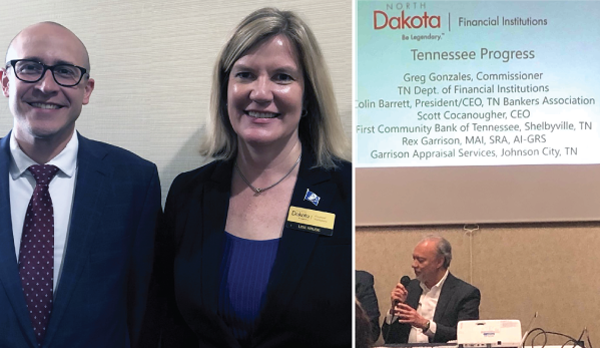Nov. 8, 2019 NASCUS Report
Posted November 8, 2019THIS WEEK: Regulators consider appraiser shortages; Comments due date set for FOM proposal; Summit looks at diversity, inclusion …; … assessments due Jan. 15; Small biz webinar, part 2, coming; Pair added to agency communications shop; Bureau leader pledges care in data collection; ON THE ROAD: in MA about compliance; BRIEFLY: Transition in NV
Conference looks for solutions
to chronic appraiser shortages
Recent federal appraisal rule changes, regulator utilization of appraisal reports and exploration of solutions for the paucity of appraisers in rural areas (such as North Dakota) dominated discussion this week of the first-ever Appraiser/Financial Industry Meeting in Bismarck, N.D.
NASCUS participated in the event, hosted by North Dakota Department of Financial Institutions Commissioner Lise Kruse, which drew more than 60 representatives from among credit unions, banks, mortgage lenders, appraisers, and both state and federal regulators.
North Dakota, this past summer, was awarded a limited temporary waiver of appraiser credentialing requirements for appraisals by the Appraisal Subcommittee of the Federal Financial Institutions Examination Council (FFIEC). The waiver request was made by the NDDFI, supported by North Dakota Gov. Doug Burgum (R) and others. The waiver was granted for one year (rather than a full five years) with an option for a second year, provided that both the NDDFI and the North Dakota Appraiser Board work to address issues that lead to the long turnaround times for an appraisal, caused by a lack of appraisers in the state.
“The open and constructive dialogue focused on exploring solutions to better understand local issues, access to data, the role of appraisal management companies, the challenges of entering the appraiser profession, and opportunities to harness technological aids,” said NASCUS President and CEO Lucy Ito, who participated in the event. NASCUS Executive Vice President and General Counsel also participated.
Others taking part in the event included: Corey Krebs (ND DFI Assistant Commissioner); Paul Brucker (Railway Credit Union), Steve Davis (Capital Credit Union), Harold Hagen (Hometown Credit Union), Jay Kruse (Credit Union Association of the Dakotas), Greg Gonzales (Tennessee DFI Commissioner), and Mary Beth Quist (CSBS).
“Many of us who participated are hopeful that forward-looking solutions developed this week in North Dakota can be used as constructive examples in other parts of the country that face a similar shortage of appraisers for both residential and commercial real estate valuations,” Ito added.
(In the photos, at left: CU Association of the Dakotas Chief Advocacy Officer Jay Kruse and North Dakota Department of Financial Institutions Commissioner Lise Kruse (no relation) share some time during the program; at right, Tennessee Department of Financial Institutions Commissioner Greg Gonzales shares his thoughts during a presentation.)

Comments due by Dec. 9 on FCU FOM proposal
Comments on NCUA’s proposed rule on chartering and field of membership (FOM) are due Dec. 9, 30 days following publication Thursday of the rule in the Federal Register. Under the proposal, a federal credit union could designate a combined statistical area (CSA), or an individual, contiguous portion of that area, as a well-defined local community (WDLC), provided that the chosen area has a population of 2.5 million or less. The NCUA Board issued the proposed rule at its Oct. 24 board meeting.
NCUA said it is phasing in new rules related to membership following a court’s ruling in August. In accordance with the August D.C. Circuit Court of Appeals ruling, with respect to communities based on a Core-Based Statistical Area (CBSA), the agency has said it is providing “further explanation and support for its elimination of the requirement to serve the CBSA’s core area” as provided for in an original FOM rule adopted in 2016 by the board. The agency also said it is proposing to clarify existing requirements and “add an explicit provision to its rules to address concerns about potential discrimination in the FOM selection for CSAs and CBSAs.”
In September, NCUA Board Chairman Rodney Hood indicated that the agency would take a “phased approach” in moving forward on its regulation, given that the court’s ruling remained subject to requests for further review. Hood also said “in the near future” the agency would consider a limited proposal to address the definition of local community. The federal court, in its decision, focused on the definition of “Core-Based Statistical Areas” that do not include the urban core.
NASCUS has pointed out that the proposal, while only affecting FCUs, strengthens the federal charter – which, the association has said, is essential for a strong dual charter system, that benefits all credit unions, both state and federal.
LINK:
NCUA proposed rule: Chartering and Field of Membership
Summit focuses on diversity, inclusion among CUs …
NASCUS was on the scene this week when NCUA Board Chairman Rodney Hood opened the agency’s first-ever “diversity, equity and inclusion” summit in Alexandria, Va. Hood has described financial inclusion as the “civil rights issue of our times,” and underscored that view in his comments, saying that “when credit union people talk about diversity, inclusion, and equity, it’s with an understanding that those values are part of this industry’s genetic code.”
“We should take pride in our achievements at elevating the commitment to diversity and inclusion, but there is still a tremendous amount of work that needs to be done,” Hood said. “Diversity, equity, and inclusion should be sources of enrichment, strength, and unity, not division.”
Hood also told the summit that he is proud to be the first African-American head of a federal financial regulatory agency. “But getting here was not easy, and I’ve worked in the financial services industry long enough to know how challenging it can be for members of under-represented communities.”
Board Members J. Mark McWatters and Todd Harper also spoke at the event, with Harper asserting that promotion of diversity and inclusion is everyone’s responsibility, resulting in broader perspectives that lead to better decisions. “By shining a light on diversity, equity and inclusion, we can create better workplaces, a more responsive government, and a credit union system that works for everyone,” Harper said. “We can, as our founders envisioned, create ‘a more perfect union.’”
NASCUS Vice President, Legislative and Regulatory Counsel Nichole Seabron represented the state system at the event.
… with assessments due Jan. 15
Federally insured credit unions have until Jan. 15 to submit their annual Voluntary Credit Union Self-Assessments for 2019 to NCUA – which asserts that there are no risks, and plenty of benefits, for submitting the information. In a “Letter to Credit Unions” (LTCU) issued Thursday, the agency said it encouraged credit unions to use the self assessment – used to monitor progress and trends in credit union diversity-related activities – to evaluate their own diversity programs and practices and for determining “how promoting greater diversity can lead to a stronger internal culture and better service.” The data collection is not part of the agency’s nor state regulators’ examination process, and has no impact on a credit union’s CAMEL rating, according to NCUA.
LINK:
NCUA LTCU 19-CU-03: Voluntary Credit Union Diversity Self-Assessment
Part 2 of ‘small business lending’ webinar set for Nov. 13
Small business lending for credit unions is the topic of another webinar on the topic scheduled for next week and sponsored by NCUA and Small Business Administration (SBA), NCUA said this week. The Nov. 13 webinar is the second part of a previous session held earlier this year. The one-hour event, which gets underway at 2 p.m. ET, features staff from both agencies covering “prudent steps credit union lenders can take to preserve their loan guarantees through the origination, servicing, and lender review cycles.”
According to NCUA, participants will be able to log into the webinar and view it on their computers or mobile devices using the registration link; pop-ups from the website should be allowed. Registration for the event is now open. The two agencies in April announced a three-year partnership, they said, to bring small businesses and credit unions together and expand awareness about SBA programs.
LINK:
The Big Picture of SBA Lending for Credit Unions – Part 2
Agency adds two to communications, external affairs staff
Gisele Roget and Evann Berry are the latest named to top positions within NCUA’s communications, external affairs, and industry engagement functions, taking on those new roles Nov. 12, NCUA Chairman Hood said this week. Roget will be deputy chief of staff and will also oversee the Office of External Affairs and Communications, leading the agency’s communications and congressional affairs initiatives, the agency said. She joins the NCUA from the Federal Housing Administration, where she served as deputy assistant secretary for single family housing since July 2017, the NCUA said. She has also been a staff member of the House Financial Services Committee. She holds a a bachelor’s degree in art history from Yale University.
Berry will be senior advisor to the chairman for communications and engagement, serving as the chairman’s media spokesperson and liaison with the credit union industry and other related stakeholders, according to NCUA. She joins the agency from the office of Sen. Cindy Hyde-Smith (R-Miss.), where she served as deputy communications director and policy advisor. She previously served as a legislative aide to former Sen. Thad Cochran (R-Miss.), handling various policy issues, including economic development, transportation, and housing, the agency said. She has a bachelor’s degree in biological engineering from Mississippi State University.
LINK:
Chairman Hood Appoints Gisele Roget, Evann Berry to Senior Roles
CFPB leader pledges great care in small biz data collection
Rules that require financial institutions to gather and report information about credit applications from minority and women-owned businesses “will be done with great care and consideration,” keeping in mind “sensitivities” expressed by some in small business, the director of the CFPB said this week.
In opening remarks to the Consumer Financial Protection bureau’s (CFPB) symposium on Section 1071 of the 2010 Dodd-Frank Wall Street Reform and Consumer Protection Act (Dodd-Frank), bureau Director Kathleen Kraninger acknowledged that the section would increase public data about small business lending.
“Congress wanted the bureau, and the public generally to better understand the landscape for all small businesses, and specifically those owned and operated by women and minorities,” she said. “And the law specifically directs the bureau to develop a rule for the collection, reporting, and publication of certain data.”
However, she said feedback from stakeholders has informed the bureau that “there is concern with the burden to small entities, possible curtailment of credit, and privacy considerations, as well as a general desire for consistency with current business practices.”
She said the agency understands the “sensitivities” and that the bureau knows “that a rule needs to be done with great care and consideration in order that the rule not impede the ability of small businesses — including minority and women owned small businesses — to access the credit they need.”
The symposium was an opportunity for the bureau to gather input as it develops its implementing regulations, she said.
LINK:
Director Kraninger’s Speech at CFPB Symposium on Section 1071 of the Dodd-Frank Act

ON THE ROAD: In MA, Compliance Risk Management is on tap
Leah Hamilton, Vice President and Senior Consultant, Education and ProBank Advisor, speaks at the NASCUS Compliance Risk Management seminar in Needham, Mass., Thursday. The program provided a comprehensive look at the details of a compliance risk management program (CRMP) and what to look for during an examination. The program described a CRMP, including what is a policy vs. procedure, monitoring vs. audit, training, complaint management, risk assessments, how to risk assess the CRMP, and a change management process in a CRMP. Also addressed was the Uniform Interagency Consumer Compliance Rating System, which establishes a framework of compliance factors that examiners use during consumer compliance examinations to assess an institution’s performance.
BRIEFLY: New interim commissioner in NV
Mary Young is the new interim commissioner for the Nevada Financial Institutions Division. She replaces Rickisha Hightower in the position.
For more information about NASCUS's news and/or public relations, please contact our Marketing and Communications Department.
